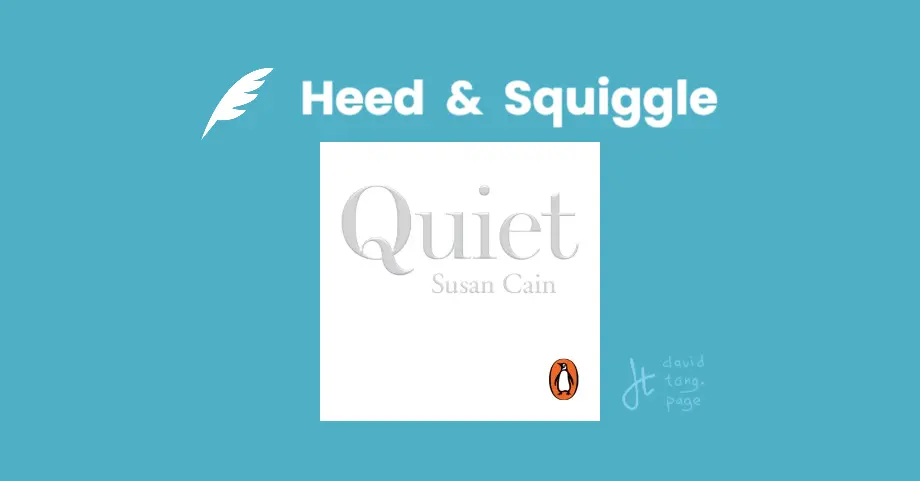Audiobook review - Quiet: Power of Introverts
This book allowed me to be at peace with myself. To accept my introversion, and finally start using my inner strengths. Introverts have an incredible place in the world, so don't feel overshadowed.

"Introverts often feel pressure to conform to the Extrovert Ideal and may suffer from feelings of inadequacy and invisibility", writes Susan Cain.
Damn, how spot on. I was hooked.
A book written by an introvert, for other introverts! I learnt much about navigating my internal conflict.
Also, there were splendid explainations on why external environment pressures in education and the workplace works against introverts.
If you are an introvert, you can't miss this one.
TL;DR - This book is for anyone who is feeling conflicted about being an introvert
Key takeaways
I have three key points that are taken away from Susan's book. Here, I list them below.
2. Role of introverts in the world
3. Superpowers of an introvert and self-acceptance
1) Understanding why the western world values extroverts
I grew up in an Asian community. A vivid memory for me was being in school and taught to simply sit down, keep shush; and listen to the teacher. This was repeatedly hammered into us throughout the schooling years (though it wasn't always abided to!).
Eastern cultures place a higher importance on social cohesion. What this means is that the greater good of the community takes precedence over the individual.
So certain issues and topics are just seen as controversial. They are not brought up because of the fear of creating dissent or change in societal norms.
I grew up in a small town, where everyone knew their friends, neighbors, and even right to their extended family. News travels quickly and within a smaller community, this means if one gets on the wrong side of another person - that person can get shunned pretty quickly. So, keeping your head down is a pretty good idea.
In general, there is also a cultural perception of being silent being equated to wisdom. There is almost the image of a wise, guru-like figure that has returned from the wilderness with the clarity that can shift anyone's inner turmoil with just a couple of words.
This was indeed true at work as well, where keeping your head down means that you are actually doing some work. I got more and more responsibilities added to my day job just by keeping quiet and carrying on with daily tasks.

Now that I am living in the Western world, all of this is turned on its head.
Keeping quiet in a job is instead seen as disinterest and disengagement.
Listening in a class means not understanding taught material, and risks being perceived as taking a long time to process things.
In the West, there is a celebration of people who "put themselves out there". Just look at the perception of recent thought leaders such as Steve Jobs and Elon Musk.
This is in part due to the rise of big business and corporations, according to Susan. ".... And that's when it really became the case that to stand out and succeed in a company, with people that you had never met before, the quality of being very magnetic, very charismatic in a job interview suddenly became very important." - as Susan Cain responds to an interview in the Guardian.
Quiet helped me to realize this difference in perception and values that is happening across the world. Read on to see how this audiobook helped me to accept myself.
2) Role of introverts in the world
Susan Cain advocates heavily for organizations to recognize introverts. She has spent a lot of time studying great leaders, and found that the world might be losing out on hidden potential with the bias towards extroversion.
She argues that there is a role for both introverts and extroverts in leadership. Extroverted leaders can garner a lot of attention and energy within a group.
Introverted leaders, she found, are better at regulating self-driven group members. Instead of being driven around by the energy of different ideas and their own ideas, as with extroverts; introverts have the ability to look deeper and keep focused on choosing ideas to solve a specific problem or task.
Unfortunately, introverts are often overlooked for promotions. They just don't seem exciting in contrast to extroverts. They are also often not groomed for leadership promotions.
She also writes about how introverts are often passed over in group settings. They don't speak up or are drowned out by their louder and more energetic extroverted peers.
Larger meetings tend to be good for building networks and meeting people. There is often a risk of groupthink. It can become an echo chamber, where people resound ideas of each other and adopt similar thinking. I think extroverts are naturally apt at navigating meetings, with the ability to quickly process multiple threads of ideas at once.
Introverts can have a superb idea, but we might miss this just because don't have the attention for them.
3) Superpowers of an introvert and self-acceptance
There are great thinkers, who have impacted the course of mankind while being introverts. This is because of the superpowers that introverts have (over extroverts).
Focus - the ability to persist on something for longer than average. Since they gain energy from working on something, the process or even learning something new on the way - they can maintain the focus.
This is in opposition to extroverts, who will need to get out there to recharge.

Imagination - introverts can be seen as 'being in the clouds' or 'being in their heads' at times. Some of the greatest and my favorite books such as the Lord of the Rings were written by introverts. JJ Tolkien went to the extent of creating whole worlds with different factions. Right down to creating their unique language, font, and inscriptions for each of the factions. This made for such a rich story.
Depth - just by nature, introverts prefer to get into deeper aspects of a task, a job, or even just within a conversation. I find myself more recharged when talking to people who want to drill several levels lower into a topic. As opposed to others who like to throw out five different aspects of life at once, and jumping across topics freely.
How does this relate to health
Susan explains further on understanding why introverts behave the way they do. It is all about stimuli.
Career longevity
This shows how different people need different amounts of "noise" or "activity levels" to function optimally. The recent pandemic necessitated the boom of the work-from-home culture.
Remote working is of course at odds with the return to office culture. As an introvert myself, I can focus better without people bustling about. I can write for longer and be more focused when I am not interrupted by people dropping by my desk several times within the hour.
I have also worked in the medical and healthcare delivery field. The setting then was in complete opposition to what I've described about writing. There was no personal desk space, constant calls for opinions, and meeting up to forty different persons on an average day.
You can probably guess by now, that it was extremely draining. I was so burnt out by several years of the profession. Susan Cain also writes about this from her experience of being a Wall Street attorney. This was the actual spark that led Susan to write this book, and going on to speak at numerous conferences to advocate for the world to recognize introverts.
Finding Your Restorative Niche
There was a cheeky story about how a professor had conjured a hobby to allow himself space to recharge in between talks. I particularly liked this narrative and example.
As an introvert, it is crucially important to remember to create time or area or locations to recharge. Just being away for a while allows us to bring our energy levels back to decent levels again, allowing us to bring our unique, hidden value to the world.
Final thoughts and disclaimer
This is a book solely about introverts, so the focus here is on this group of people in society. There are, of course, various varying levels of introversion and extroversion. It does not mean one is superior over the other, rather the focus here is to understand ourselves and each other better.
It is rather the celebration of both introverts and extroverts that makes the magic happen.
The combination of Steve Jobs (extroverted, idealist, speaker) and Steve Wozniak (introverted, technical, designer) was the leading driver behind Apple.
Introverts - stop putting yourselves down or forcing yourself into a self-conflicting mould that the extroverted world seems to want. Instead, recognise your powers and show them to the world.

Quiet: The Power of Introverts in a World That Can't Stop Talking
An audiobook for every introvert to get lost in, and come back out feeling recharged yet not so lost.
